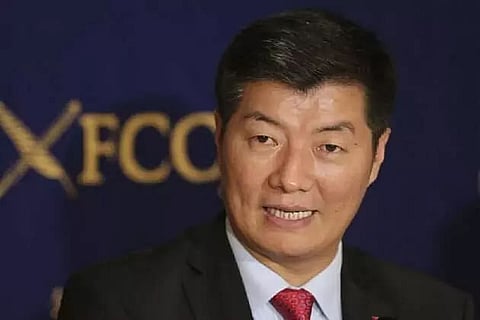
- Home
- Live Blog
- Breaking News
- Top Headlines
- Cities
- NE News
- Sentinel Media
- Sports
- Education
- Jobs

DHARAMSALA: For the first time in six decades, Central Tibetan Administration (CTA) president Lobsang Sangay has entered the White House — a historic recognition by the United States to the democratically elected government-in-exile that is headquartered in this northern Indian hill station.
This is for the first time that the head of the CTA has been invited into the White House, said a spokesperson for the CTA on Saturday.
Last month, Sangay became the first CTA president to be formally invited into the US State Department to meet Assistant Secretary and Special Coordinator for Tibetan Issues Robert Destro.
In the last six decades, the head of the CTA was denied entry to the US State Department and the White House; the logic for both denials was that the US government did not recognize the Tibetan government in exile.
"Today's visit amounts to an acknowledgement of both the democratic system of the CTA and its political head," said the spokesperson.
Sangay met the White House officials.
Prior to this meeting, Sangay had met the White House officials in undisclosed meetings and locations over a dozen times in the past 10 years since he became the CTA's president in 2011.
This unprecedented meeting perhaps will set an optimistic tone for CTA participation with US officials and be more formalized in the coming years, said the CTA.
Though he nears the end of his second consecutive term as the CTA president, Sangay has tirelessly advocated for the Tibetan Policy and Support Act of 2019.
Earlier this week, Sangay had several virtual meetings. Through meetings, Sangay has discussed the Tibetan Policy and Support Act and other matters with the Congressional-Executive Commission on China Chairman Jim McGovern and senior Senate Foreign Relations Committee staffers, both on the Republican and Democrat side.
CTA Representative Ngodup Tsering and Kelsang Dolma accompanied Sangay on these meetings in the White House.
Before heading to the US on his second leg of tour in less than a month, Sangay told IANS in an exclusive interview that the next priority of his government is passing of Tibet Policy and Support Act in the Senate.
"This Act builds on the Tibet Policy and Support Act of 2002 and will be a major update to the US policy on Tibet. Among important updates, passing of this Act will make it the official policy of the US to see that the selection of Tibetan Buddhist leaders, including the future Dalai Lama, follows the wishes of the Tibetan Buddhist community and according to the instructions of current Dalai Lama without any influence from the Chinese government," Sangay said categorically .
Without mincing words, he added, "The Act will also forbid China from opening a new consulate until a US consulate is allowed in Lhasa." Sangay, the youngest to head the government-in-exile, said the State Department has always maintained that the CTA is the Tibetan government-in-exile. (IANS)